Hong Kong Protests Turn Violent, Authorities Delay Extradition Vote
Protests in Hong Kong as police unleashed tear gas on protesters and authorities delayed a vote on a controversial extradition law.
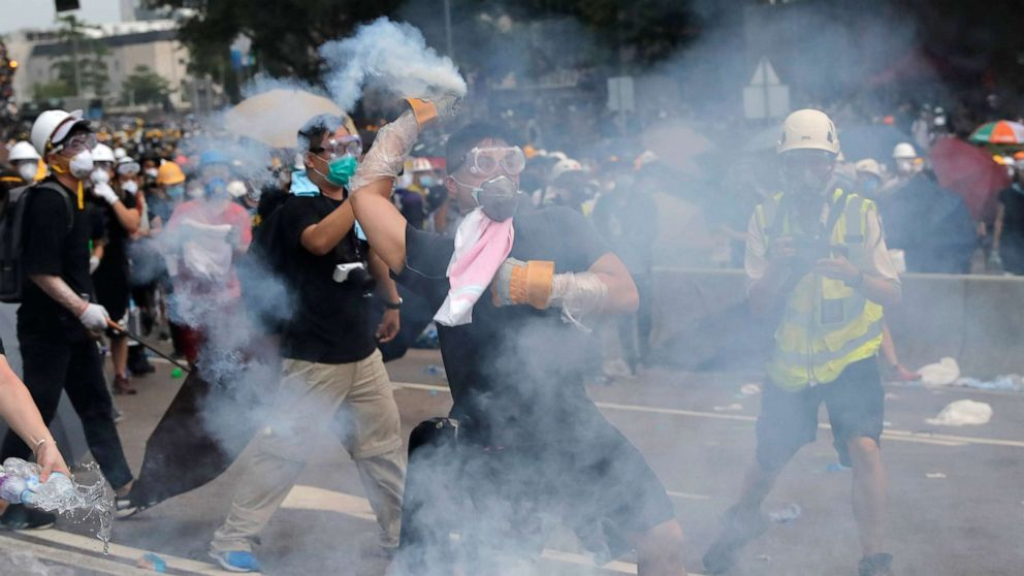
The protests over a proposed change to extradition laws that began earlier this week have continued in Hong Kong, and have now turned violent thanks to a government response that corresponds to a decision by city authorities to delay the vote on the new law in light of the protests:
HONG KONG — Riot police fired tear gas and rubber bullets in downtown Hong Kong on Wednesday as they repelled tens of thousands of protesters who had swarmed the city’s legislature in anger over proposed legislation that would allow extraditions to mainland China.\
The street confrontation began on Wednesday afternoon when a small number of protesters stormed police barricades outside the Legislative Council and hurled bricks, bottles and umbrellas at the officers. The riot police responded by firing rubber bullets, beanbag rounds and tear-gas canisters at the protesters.
The large-scale clashes — rare in this financial hub — underscore both the deep-seated anger that protesters feel about the erosion of liberties in the territory and the police’s resolve to maintain order.
It was a sharp escalation of violence in a protest movement that took off in earnest on Sunday when an estimated 1 million people marched against the extradition bill and China’s growing influence in the territory. That march ended with small clashes in the early hours of Monday, but protesters began pouring back into the area around the legislature on Tuesday night ahead of a debate on the bill scheduled for the next day.
Carrie Lam, who was selected by China’s leaders to govern Hong Kong two years ago, stood firm on Wednesday against what she called an “organized riot” and said she would not withdraw the contentious bill.
She also compared the demonstrators to stubborn children, in remarks made before the protests turned violent.
On Wednesday afternoon, Stephen Lo, the police commissioner, described the demonstrations as “riots” and called on protesters to go home, warning that those who refused “might regret your decision for your entire life.”
With a volley of tear gas canisters, the police forced the protesters to retreat from the Legislative Council and into the streets. There, the protesters engaged in several skirmishes with riot officers, who hit them with batons. At least on one occasion, in full view of reporters watching from a bridge, one officer severely beat a protester who fell down during the retreat, steps away from the Legislative Council.
The police had cleared some of the area by early Wednesday evening, but not entirely, and the smell of tear gas still hung over downtown. Hong Kong’s Hospital Authority said that 22 people had been taken to public hospitals with injuries sustained in the demonstrations.
As said on Monday, the roots of all this lie in the fact that the city’s legislature is considering a change in the existing extradition law that would make it easier for authorities to send alleged criminals to the mainland for prosecution. Under present laws, those powers are limited and those limitations rea meant to protect citizens and professionals such as journalists who enjoy much greater rights in Hong Kong than they do in the rest of China. The obvious fear, of course, is that the expanded extradition authority would be used to crack down on Chinese dissidents who have otherwise been protected under Hong Kong law.
It’s also worth noting that this isn’t the first time that Hong Kong residents have taken to the streets to protest incursions against their liberties by government authorities. Protests also took to the streets five years ago in response to proposed political reforms that would have limited the right of residents to speak out freely as guaranteed by the treaty China signed in 1997. In that case, the protests fizzled out after reaching a peak nearly as big as what we’re seeing now, but they effectively succeeded in that the legal changes were either scaled back or canceled altogether. These protests, as well as those that occur every June marking the anniversary of the Tiananmen Square massacre, show that the people of Hong Kong continue to jealously guard the rights they have under the law and which China is required to protect under the terms of the agreement with the United Kingdom that returned the territory to Chinese rule. Of course, there would be little chance of a military clash between Great Britain and China if such a crackdown occurred, but it would be strongly resented by the population. This is likely why any perceived efforts to limit those rights would be met with protest.
Another factor motivating China to restrain itself in Hong Kong, of course, is the fact that the leadership is wise enough to know that doing so would be a disaster both in terms of the widespread coverage it would receive from the western media, which is well-established in the city, and internationally. Even in this era where prosperity is becoming more widespread in China a whole, Hong Kong remains the goose that laid the golden egg and the leadership in Beijing is obviously too smart to mess that up. There’s always the possibility that they will lose patience in one of these situations and that they will overreact to the protests in Hong Kong as they did in Tiananmen. At that point, though, they may find that they’ve bitten off more than they can chew.

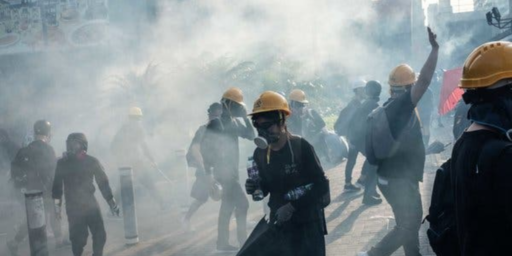
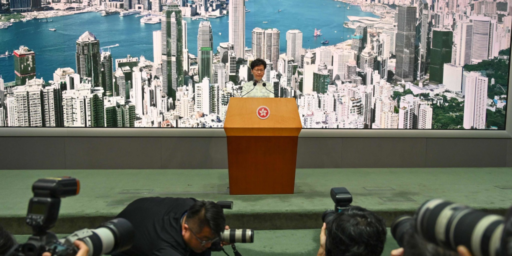
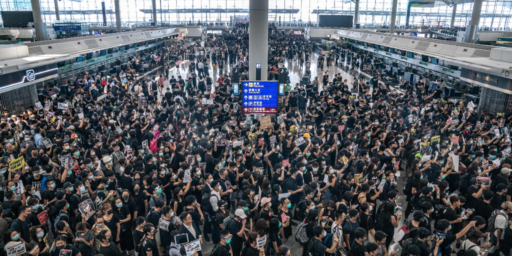
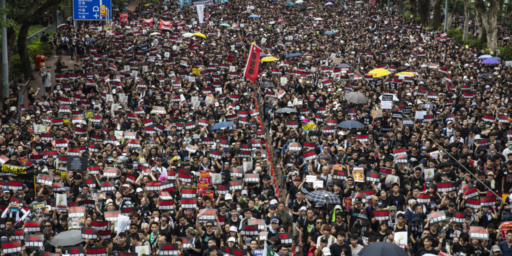
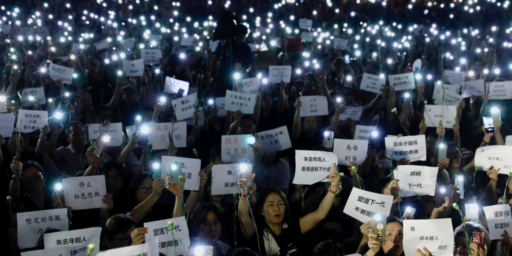
I await trump’s soon to be released statement of praise for Xi’s leadership in these troubled times.
I’m sure the trash in the White House is jealous that he can’t do the same thing here…there’s very little worse than an American president with dictator envy…
It can no longer be denied by any fair-minded person: Donald Trump is a traitor to the United States, our Constitution and the American people. He is not the legitimate president. He must be removed.
https://abcnews.go.com/Politics/id-exclusive-interview-trump-listen-foreigners-offered-dirt/story?id=63669304
@michael reynolds: I’m sitting here stunned. He actually went there voluntarily, no hedging, just casually admitted to the whole world that he is a traitor. I keep thinking that maybe his whole life has been one continuous episode of performance art.
That statement is basically a version of him shooting someone on Fifth Avenue.
Cue up the tut tuts from Romney and Collins.
I think I’ve said it before here but the “Hong Kong is the Goose that laid the golden egg” meme just really isn’t true. Or at least it’s not as true as it was in the late 1990’s.
The limitations placed on the mainland government by the Sino British Joint Declaration may actually hold up until 2047 though I doubt it. Regardless, there’s nothing the UK, US or any other country will do if they don’t.
If nothing else, the 1989 protest in Tiananmen Square should have taught us that China isn’t really moved by bad publicity.
Ironically, after all the Hong Kong elite spent on massive evacuation vessels in preparation for the handover they will probably have to use them sooner rather than later.
@Davebo:
I have to disagree with this. Tiananmen Square had and is still having a profound effect on the Chinese government, although admittedly more internally than externally. This isn’t Russia or Imperialist China, with a long history of despising the peasants and shooting them at will. These were children of the Maoist revolution, many of whom believed at some level that their legitimacy came from the people. (Think of it like Mitch McConnell – he can be a profoundly corrupt and corrupting individual doing real harm to democracy while still taking pride in being a government official in the USA, considered the champion of democracy.) So in the first place, the government shot their own people. In the second, these weren’t just any people, but the children of the elites – they were university students in Beijing and so an especially outsized portion were children of well connected government officials. And even with connections, getting into Peking University or one of the other top tier colleges requires a level of dedication and work that a Westerner has trouble even imagining. Everyone in the country knew that these students and their parents had sacrificed tremendously to reach this level. Third, however it sounds, the students killed had no brothers or sisters because of the one child policy. Their parents and grandparents had sacrificed for 20 years or more, and their entire futures were bound up in the success of these offspring (adult children, not the state, are expected to provide for their parents and grandparents in the future, no easy task with the 1-2-4 generation: one child taking care of two parents and four grandparents).
So like I said, the Chinese Government is hyperaware of the bad publicity and that is exactly why they have spent thirty years trying to erase it from the public record. Chinese Citizens who are educated in the West are often deeply shocked when they learn what really happened although, truth be told, many more just kind of avoid such things and partition it off in some vague back room of the mind.